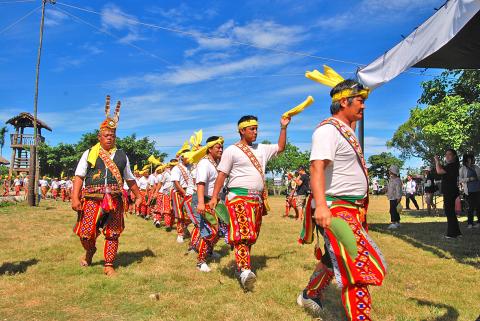The Taitung County Government has been promoting Aboriginal harvest festivals scheduled for this month and next to attract tourists to the region, much to the chagrin of Aboriginal residents, who say the festivals are a time for community gatherings and not a performance for snap-happy tourists.
A total of 148 harvest festivals are scheduled take place these two months, with the Pangcah Fulafulangan community having taken the lead on Sunday and the last one being held on Aug. 23.
The biggest among them are the Makapahay Cultural Festival, organized by the Taitung City Government, the Rukai Taromak’s harvest ritual, the Puyuma’s mulaliyaban (sea festival) and the Katratripulr’s kavarasa’an (millet harvest festival).

Photo: Chen Hsien-yi, Taipei Times
The kavarasa’an, which starts on Tuesday, is a five-day festival that attracts large groups of visitors every year. However, as tourism has become a mainstay in the area, with the support of the local government, many of the traditional festivals have become big tourist attractions in the summer.
Travel agencies have cashed in on the opportunity, but taken local taboos lightly, many Aboriginal communities have complained.
Some tourists walk into sacred places dedicated to ancestral spirits, enter meeting places that are closed to women, and move around or take pictures without permission, they said.
Rukai Taromak Community Development Association secretary-general Pan Wang Wen-pin (潘王文賓) said that Aboriginal communities usually designate a picture-taking zone to avoid visitors intruding on the ceremonies, but many tourists often violate the rules and cause unnecessary trouble.
Kakimi, of the Katratripulr community, said that tourists often ask questions like: “How come you haven’t started dancing?” “Why don’t you sing for us?” and “What are you guys eating, can we have some, too?”
Aborigines can only patiently respond to these questions out of courtesy, Kakimi wrote in a public letter.
What tourists see as “cultural products” are part of the “real life” of Aborigines, who do not want them to be consumed like commodities, she said, adding that each member of the tribes has put their efforts into protecting local traditions.
“When [tourists] visit these tribes, looking forward to singing, dancing, eating Aboriginal food, taking pictures or even trying on traditional clothes, what they overlook is the months or even year-long preparation that go into the holding of these two or three-day ceremonies,” Kakimi said.
She urged visitors to put down their cameras and get acquainted with Aborigines and the practices that go into making these festivities.
“Respect is what most Aborigines expect. Drop the ‘I am the customer waiting to be served’ mentality,” she said.

NATIONAL SECURITY THREAT: An official said that Guan Guan’s comments had gone beyond the threshold of free speech, as she advocated for the destruction of the ROC China-born media influencer Guan Guan’s (關關) residency permit has been revoked for repeatedly posting pro-China content that threatens national security, the National Immigration Agency said yesterday. Guan Guan has said many controversial things in her videos posted to Douyin (抖音), including “the red flag will soon be painted all over Taiwan” and “Taiwan is an inseparable part of China,” while expressing hope for expedited “reunification.” The agency received multiple reports alleging that Guan Guan had advocated for armed reunification last year. After investigating, the agency last month issued a notice requiring her to appear and account for her actions. Guan Guan appeared as required,

A strong cold air mass is expected to arrive tonight, bringing a change in weather and a drop in temperature, the Central Weather Administration (CWA) said. The coldest time would be early on Thursday morning, with temperatures in some areas dipping as low as 8°C, it said. Daytime highs yesterday were 22°C to 24°C in northern and eastern Taiwan, and about 25°C to 28°C in the central and southern regions, it said. However, nighttime lows would dip to about 15°C to 16°C in central and northern Taiwan as well as the northeast, and 17°C to 19°C elsewhere, it said. Tropical Storm Nokaen, currently

PAPERS, PLEASE: The gang exploited the high value of the passports, selling them at inflated prices to Chinese buyers, who would treat them as ‘invisibility cloaks’ The Yilan District Court has handed four members of a syndicate prison terms ranging from one year and two months to two years and two months for their involvement in a scheme to purchase Taiwanese passports and resell them abroad at a massive markup. A Chinese human smuggling syndicate purchased Taiwanese passports through local criminal networks, exploiting the passports’ visa-free travel privileges to turn a profit of more than 20 times the original price, the court said. Such criminal organizations enable people to impersonate Taiwanese when entering and exiting Taiwan and other countries, undermining social order and the credibility of the nation’s

‘SALAMI-SLICING’: Beijing’s ‘gray zone’ tactics around the Pratas Islands have been slowly intensifying, with the PLA testing Taiwan’s responses and limits, an expert said The Ministry of National Defense yesterday condemned an intrusion by a Chinese drone into the airspace of the Pratas Islands (Dongsha Islands, 東沙群島) as a serious disruption of regional peace. The ministry said it detected the Chinese surveillance and reconnaissance drone entering the southwestern parts of Taiwan’s air defense identification zone early yesterday, and it approached the Pratas Islands at 5:41am. The ministry said it immediately notified the garrison stationed in the area to enhance aerial surveillance and alert levels, and the drone was detected in the islands’ territorial airspace at 5:44am, maintaining an altitude outside the effective range of air-defense weaponry. Following